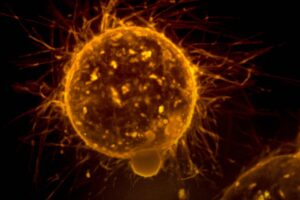Humanigen, a clinical stage biopharmaceutical company focused on preventing and treating an immune hyper-response called ‘cytokine storm’ with lenzilumab, today announced that MedStar Washington Hospital Center in Washington, D.C. treated its first Covid-19 patient with lenzilumab.

Humanigen has announced first patient dosed in phase 3 clinical study of lenzilumab in Covid-19. (Credit: mattthewafflecat from Pixabay)
Subscribe to our email newsletter
The primary goal of this Phase 3 randomized, double-blind, multicenter, placebo-controlled clinical trial is to determine if lenzilumab can help hospitalized patients with COVID-19 recover faster. As many as 89% of hospitalized patients with COVID-19 are at risk of a complication called cytokine storm, a harmful inflammation that has been the leading cause of COVID-19 death.
MedStar Washington Hospital Center is one of 18 sites in the U.S. approved to enroll eligible patients to study lenzilumab, designed specifically to stop this storm. Eligible patients can participate in this trial while also receiving other standard-of-care therapies as recommended by their treating physician.
“Given the growing number of cases in the D.C. area seen in the past few weeks, we were particularly motivated to ensure our Phase 3 study was enrolling and accessible,” said Cameron Durrant, MD, MBA, chief executive officer of Humanigen.
“We have been impressed with the hospital leadership and trial investigators at MedStar Washington, and worked together with speed and efficiency to get this trial location ready to enroll patients.”
Humanigen, Inc. is developing its portfolio of clinical and pre-clinical therapies for the treatment of cancers and infectious diseases via its novel, cutting-edge GM-CSF neutralization and gene-knockout platforms. We believe that our GM-CSF neutralization and gene-editing platform technologies have the potential to reduce the inflammatory cascade associated with coronavirus infection.
The company’s immediate focus is to prevent or minimize the cytokine release syndrome that precedes severe lung dysfunction and ARDS in serious cases of SARS-CoV-2 infection.
The company is also focused on creating next-generation combinatory gene-edited CAR-T therapies using strategies to improve efficacy while employing GM-CSF gene knockout technologies to control toxicity. In addition, the company is developing its own portfolio of proprietary first-in-class EphA3-CAR-T for various solid cancers and EMR1-CAR-T for various eosinophilic disorders.
Source: Company Press Release
 Advertise With UsAdvertise on our extensive network of industry websites and newsletters.
Advertise With UsAdvertise on our extensive network of industry websites and newsletters.
 Get the PBR newsletterSign up to our free email to get all the latest PBR
news.
Get the PBR newsletterSign up to our free email to get all the latest PBR
news.

